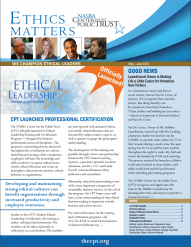Lead with Integrity: Traveling the Uncommon Path (May/June 2016)
Ethics Matters
May/June 2016
 I am constantly reading, interviewing and researching leaders to gain an understanding of how they achieve success. In recent months, I have seen two consistent, yet unusual (in relation to today’s standards), attitudes from leaders thriving in their business and personal endeavors. Combined, these attitudes strike me as the Uncommon Path exceptional leaders take to succeed.
I am constantly reading, interviewing and researching leaders to gain an understanding of how they achieve success. In recent months, I have seen two consistent, yet unusual (in relation to today’s standards), attitudes from leaders thriving in their business and personal endeavors. Combined, these attitudes strike me as the Uncommon Path exceptional leaders take to succeed.
The first attitude is one of commitment that far exceeds the level of others. This type of commitment comes with a strong, personal attachment or mission that is usually connected with what the leader feels is part of his or her purpose. Leaders with this level of commitment feel success is mandatory and failure is not the end point, it is simply an opportunity to redirect with a new strategy. This type of commitment is found in ethical leaders across the country and also in leaders throughout history, such as Moses, George Washington and Dr. Martin Luther King, Jr. These leaders all found purpose and pursued it with extreme commitment, an Uncommon Path.
The second attitude is having a willingness to sacrifice when others will not. In every sector of our society, great leaders take on a higher calling by making significant sacrifices to achieve success. Willingness to sacrifice is connected to belief in purpose, which motivates these leaders to pursue greatness. Common sacrifices leaders make include personal time, finances, other opportunities, etc. However, the greatest leaders sacrifice pleasures to carry out their purpose. This is what Nelson Mandela and the Wright brothers, Orville and Wilbur sacrificed and took Uncommon Paths.
Mr. Mandela believed that the cause was greater than him, and he went to jail for it. Later, after becoming the president of South Africa, he chose to serve only one term because he knew the country would be better without him being a long-tenured president. The Wright brothers sacrificed time to learn how to fly. While neither of them graduated from high school, they took the time to learn aeronautical engineering and were first in flight.
Finally, to add to the two attitudes, I also discovered that leaders traveling the Uncommon Path also have an authenticity that attracts others to their mission. Uncommon Path leaders generate followers because others see their authenticity and commitment to the people, mission, and purpose.
Leader, are you committed? Are you making the necessary sacrifices? Do others believe in your authenticity? Are you traveling the Uncommon Path?
— As Always, Lead With Integrity!
Alfonzo Alexander
President, CPT
CRO, NASBA
